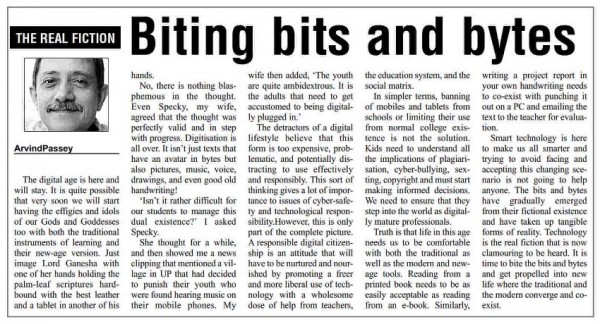The digital age is here and will stay. It is quite possible that very soon we will start having the effigies and idols of our Gods and Goddesses too with both the traditional instruments of learning and their new-age version. Just image Lord Ganesha with one of her hands holding the palm-leaf scriptures hard-bound with the best leather and a tablet in another of his hands.
No, there is nothing blasphemous in the thought. Even Specky, my wife, agreed that the thought was perfectly valid and in step with progress. Digitisation is all over. It isn’t just texts that have an avatar in bytes but also pictures, music, voice, drawings, and even good old handwriting!
‘Isn’t it rather difficult for our students to manage this dual existence?’ I asked Specky.
She thought for a while, and then showed me a news clipping that mentioned a village in UP that had decided to punish their youth who were found hearing music on their mobile phones. My wife then added, ‘The youth are quite ambidextrous. It is the adults that need to get accustomed to being digitally plugged in.’
The detractors of a digital lifestyle believe that this form is too expensive, problematic, and potentially distracting to use effectively and responsibly. This sort of thinking gives a lot of importance to issues of cyber-safety and technological responsibility. However, this is only part of the complete picture. A responsible digital citizenship is an attitude that will have to be nurtured and nourished by promoting a freer and more liberal use of technology with a wholesome dose of help from teachers, the education system, and the social matrix.
In simpler terms, banning of mobiles and tablets from schools or limiting their use from normal college existence is not the solution. Kids need to understand all the implications of plagiarisation, cyber-bullying, sexting, copyright and must start making informed decisions. We need to ensure that they step into the world as digitally mature professionals.
Truth is that life in this age needs us to be comfortable with both the traditional as well as the modern and new-age tools. Reading from a printed book needs to be as easily acceptable as reading from an e-book. Similarly, writing a project report in your own handwriting needs to co-exist with punching it out on a PC and emailing the text to the teacher for evaluation.
Smart technology is here to make us all smarter and trying to avoid facing and accepting this changing scenario is not going to help anyone. The bits and bytes have gradually emerged from their fictional existence and have taken up tangible forms of reality. Technology is the real fiction that is now clamouring to be heard. It is time to bite the bits and bytes and get propelled into new life where the traditional and the modern converge and co-exist.
Arvind Passey
Written on 21 September 2012
Published in ‘The Education Post’ dated 24 September 2012










